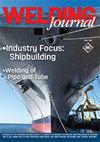RSW过程中电极压痕速率对LME形成的影响
IF 1.4
3区 材料科学
Q2 METALLURGY & METALLURGICAL ENGINEERING
引用次数: 2
摘要
在汽车用高级高强度镀锌钢(ahss)的电阻点焊过程中,各种不利因素的综合影响可能导致液态金属脆化(LME)开裂。在本研究中,研究了不同焊接电流水平和焊接时间对第三代ahss中LME开裂趋势的相互作用。LME表现为焊点周围的高穿透性裂纹,焊接电流低于排出极限。同时,观察到的LME开裂趋势与所研究的焊接过程的总热量输入没有直接关系。为了确定LME开裂趋势的可靠指标,通过有限元模拟分析了焊接过程中观察到的裂纹起源处的局部应变率。虽然局部应变率与工艺相关的LME开裂趋势有很好的相关性,但由于其过程不连续,难以解释。因此,在实验测量焊接过程中电极位移的基础上,提出了电极压痕速度作为量化开裂倾向的描述性指标。本文章由计算机程序翻译,如有差异,请以英文原文为准。
The Influence of Electrode Indentation Rate on LME Formation during RSW
During resistance spot welding of zinc-coated advanced high-strength steels (AHSSs) for automotive production, liquid metal embrittlement (LME) cracking may occur in the event of a combination of various unfavorable influences. In this study, the interactions of different welding current levels and weld times on the tendency for LME cracking in third-generation AHSSs were investigated. LME manifested itself as high-penetration cracks around the circumference of the spot welds for welding currents closely below the expulsion limit. At the same time, the observed tendency for LME cracking showed no direct correlation with the overall heat input of the investigated welding processes. To identify a reliable indicator of the tendency for LME cracking, the local strain rate at the origin of the observed cracks was analyzed over the course of the welding process via finite element simulation. While the local strain rate showed a good correlation with the process-specific LME cracking tendency, it was difficult to interpret due to its discontinuous course. Therefore, based on the experimental measurement of electrode displacement during welding, electrode indentation velocity was proposed as a descriptive indicator for quantifying cracking tendency.
求助全文
通过发布文献求助,成功后即可免费获取论文全文。
去求助
来源期刊

Welding Journal
工程技术-冶金工程
CiteScore
3.00
自引率
0.00%
发文量
23
审稿时长
3 months
期刊介绍:
The Welding Journal has been published continually since 1922 — an unmatched link to all issues and advancements concerning metal fabrication and construction.
Each month the Welding Journal delivers news of the welding and metal fabricating industry. Stay informed on the latest products, trends, technology and events via in-depth articles, full-color photos and illustrations, and timely, cost-saving advice. Also featured are articles and supplements on related activities, such as testing and inspection, maintenance and repair, design, training, personal safety, and brazing and soldering.
 求助内容:
求助内容: 应助结果提醒方式:
应助结果提醒方式:


